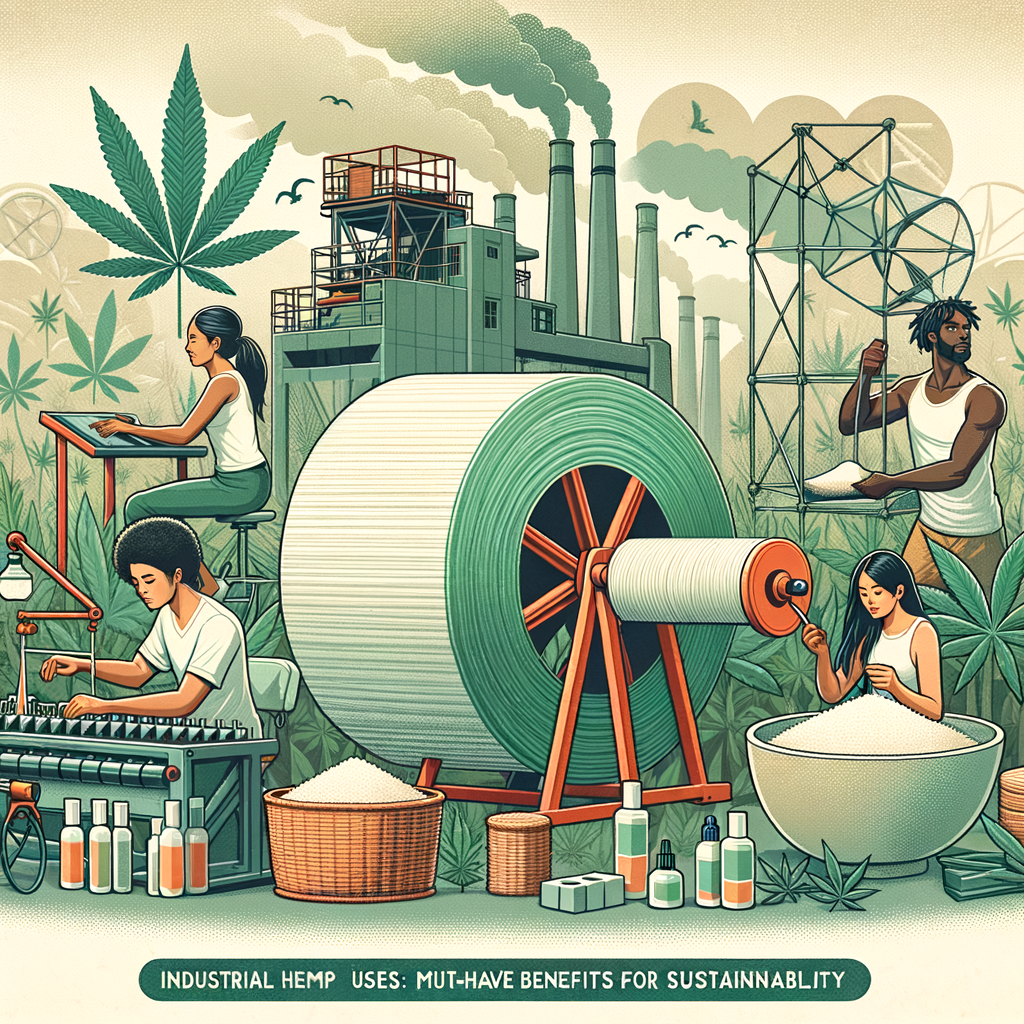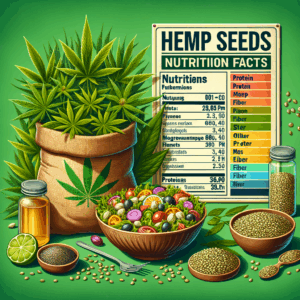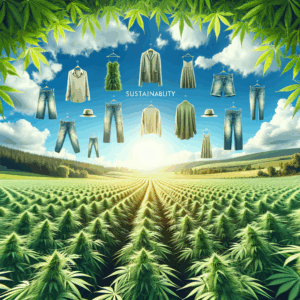
Industrial Hemp Uses: Must-Have Benefits for Sustainability
- What is Industrial Hemp?
- Eco-Friendly Textiles
- Pros of Hemp Textiles
- Building Materials
- Hemp Building Advantages
- Bioplastics and Packaging
- Benefits of Hemp Bioplastics
- Health and Wellness Products
- Nutritional Benefits of Hemp
- Soil Health and Biodiversity
- Advantages for Soil and Biodiversity
- Economic Opportunities
- Key Economic Benefits
- Challenges Ahead
- Major Challenges
- Future of Industrial Hemp
- Conclusion
- Frequently Asked Questions (FAQs)
- 1. What is industrial hemp?
- 2. How is industrial hemp different from marijuana?
- 3. What are the benefits of using hemp textiles?
- 4. Can hemp be used in construction?
- 5. What are hemp bioplastics?
- 6. Are there health benefits to consuming hemp?
- 7. How does growing hemp benefit the soil?
- 8. What economic opportunities does industrial hemp create?
- 9. What are the challenges facing the industrial hemp industry?
- 10. What does the future look like for industrial hemp?
- References
What is Industrial Hemp?
Industrial hemp is a versatile plant derived from the Cannabis sativa family. Unlike its more famous cousin, marijuana, hemp contains low levels of THC, the psychoactive compound. This characteristic allows hemp to be used safely in various applications. Farmers have cultivated hemp for centuries due to its strength and durability. This unique plant has gained attention in recent years for its potential benefits, particularly concerning sustainability.
Despite its historical significance, many people remain unfamiliar with the numerous industrial hemp uses. From textiles to building materials, hemp offers a range of eco-friendly alternatives to conventional products. Examining these uses reveals why industrial hemp is becoming increasingly relevant in discussions about sustainability.
Eco-Friendly Textiles
One of the most well-known industrial hemp uses lies in textiles. Hemp fibers are strong, durable, and biodegradable. Unlike cotton, hemp requires less water and no pesticides to grow. As a result, hemp textiles are an environmentally friendly alternative for the fashion industry.
Hemp fabrics are breathable, moisture-wicking, and highly resistant to mold and UV light. These properties increase the lifespan of hemp clothing, making it more sustainable. As consumers become more conscious about their environmental impact, the demand for eco-friendly textiles continues to rise.
Pros of Hemp Textiles
– Durability: Hemp fabrics last longer than many synthetic options.
– Biodegradable: Unlike plastic-based materials, hemp decomposes naturally.
– Less Water: Hemp requires significantly less irrigation compared to cotton.
By choosing hemp textiles, consumers can reduce their carbon footprint while supporting sustainable agriculture.
Building Materials
Industrial hemp also shines in the realm of building materials. Hempcrete, a concrete alternative made from hemp hurds and lime, offers a lightweight, insulating, and eco-friendly solution for construction. This sustainable building material provides various advantages compared to traditional concrete.
Hempcrete contributes to energy efficiency by regulating temperature and humidity inside buildings. Furthermore, it absorbs CO2 during its lifecycle, making it a carbon-negative choice for construction. With the growing focus on sustainable urban development, hempcrete’s appeal continues to expand.
Hemp Building Advantages
– Insulation: Hempcrete excels at insulating buildings, reducing energy consumption.
– Fire Resistance: Hemp-based materials are naturally fire-resistant, adding another layer of safety.
– Carbon Sequestration: Building with hemp contributes to reducing greenhouse gases.
Incorporating hemp into construction practices paves the way for greener urban environments.
Bioplastics and Packaging
Industrial hemp also plays a crucial role in the development of bioplastics. Traditional plastics pose a significant environmental threat due to their long decomposition time. In contrast, hemp-based bioplastics offer an alternative that is biodegradable and compostable.
Hemp bioplastics can be used for various applications, from packaging materials to consumer goods. They break down much faster than their petroleum-based counterparts. As industries seek to minimize their ecological footprint, the push for hemp-based products grows stronger.
Benefits of Hemp Bioplastics
– Biodegradable: Unlike conventional plastics, hemp bioplastics decompose naturally.
– Lower Carbon Footprint: Producing hemp plastics emits fewer greenhouse gases.
– Versatility: Hemp bioplastics can take various shapes and forms.
Switching to hemp-based packaging can dramatically reduce plastic pollution.
Health and Wellness Products
Another important category of industrial hemp uses involves health and wellness products. Hemp seeds and oil are rich in essential fatty acids, proteins, and vitamins. Many people incorporate hemp into their diets for its numerous nutritional benefits.
The omega-3 and omega-6 fatty acids found in hemp promote heart health and reduce inflammation. Using hemp oil in skincare products also enhances hydration and improves skin health. Growing interest in natural alternatives fuels the demand for these health-promoting hemp products.
Nutritional Benefits of Hemp
– Rich in Protein: Hemp seeds provide a complete protein source.
– Essential Fatty Acids: They contain an ideal ratio of omega-3 to omega-6 fatty acids.
– Vitamins and Minerals: Hemp oil is high in vitamin E, magnesium, and zinc.
Choosing hemp products contributes to improved health and wellness.
Soil Health and Biodiversity
Hemp cultivation also positively impacts soil health and biodiversity. This plant has deep roots that help prevent soil erosion. Additionally, hemp requires fewer chemical inputs than other crops, making it a more sustainable choice for farmers.
The growing interest in regenerative agriculture highlights the importance of crops like hemp. Farmers who integrate hemp into their rotations can improve soil quality, enhance biodiversity, and increase crop yields. This multifaceted approach to agriculture supports long-term sustainability goals.
Advantages for Soil and Biodiversity
– Erosion Control: Deep roots stabilize the soil, reducing erosion risks.
– Pesticide Reduction: Hemp’s natural resistance to pests minimizes chemical use.
– Biodiversity Support: Hemp cultivation encourages a diverse range of plant and animal life.
Practicing sustainable farming with hemp can benefit the entire ecosystem.
Economic Opportunities
Industrial hemp represents a wealth of economic opportunities for farmers and industries alike. As demand for sustainable products increases, the market for hemp-based goods expands. Farmers can diversify their crop portfolios, increasing resilience and profitability.
New job opportunities arise in sectors like processing, manufacturing, and retail. Local economies see a boost as hemp becomes more mainstream. Investing in hemp industries can drive economic growth while adhering to sustainability principles.
Key Economic Benefits
– Job Creation: New industries linked to hemp generate employment opportunities.
– Market Growth: The rising demand for sustainable products boosts the hemp market.
– Diverse Revenue Streams: Farmers can grow hemp alongside other crops for extra income.
The economic potential of industrial hemp is immense.
Challenges Ahead
Despite its many benefits, the industrial hemp industry faces challenges. Restrictions and regulations surrounding hemp cultivation vary significantly from region to region. This variability creates uncertainty for farmers looking to enter the market.
Moreover, public perception still lingers from the negative stigma surrounding cannabis. Bridging this gap requires education and awareness campaigns to inform consumers. As awareness grows, it becomes increasingly clear that industrial hemp plays a pivotal role in sustainability.
Major Challenges
– Regulatory Barriers: Inconsistent regulations hinder market growth.
– Stigma Reduction: Overcoming misconceptions about hemp is essential for acceptance.
– Infrastructure Needs: The industry requires investment in processing and distribution.
Addressing these challenges will be crucial for leveraging hemp’s full potential.
Future of Industrial Hemp
Looking forward, the future of industrial hemp appears promising. As sustainability becomes increasingly critical in various sectors, hemp stands out as a viable option. Industries across textiles, construction, and health care are set to benefit from its versatility.
Advancements in technology and processing techniques can enhance the viability of hemp. As research continues to unlock its potential, expect new applications to emerge. Ultimately, the question isn’t whether industrial hemp will succeed, but how rapidly it will transform industries.
Conclusion
Industrial hemp offers a wealth of sustainable benefits. From eco-friendly textiles to innovative building materials, its diverse applications present a compelling case for adoption. Supporting hemp cultivation can drive economic growth, improve health outcomes, and contribute to environmental sustainability.
As awareness grows regarding the many industrial hemp uses, it’s crucial to push for policies that support its growth. By embracing the full potential of this remarkable plant, we can collectively work toward a more sustainable future.
Frequently Asked Questions (FAQs)
1. What is industrial hemp?
Industrial hemp is a variety of the Cannabis sativa plant used for various non-intoxicating applications, such as textiles, building materials, and health products.
2. How is industrial hemp different from marijuana?
Industrial hemp contains low levels of THC, the psychoactive compound found in marijuana. This makes hemp safe for a variety of industrial uses.
3. What are the benefits of using hemp textiles?
Hemp textiles are durable, biodegradable, and require less water compared to cotton. They provide eco-friendly alternatives in the fashion industry.
4. Can hemp be used in construction?
Yes, hemp can be used as a building material, particularly in the form of hempcrete, which offers excellent insulation and is carbon-negative.
5. What are hemp bioplastics?
Hemp bioplastics are sustainable alternatives to traditional plastics made from hemp fibers. They are biodegradable and can significantly reduce plastic pollution.
6. Are there health benefits to consuming hemp?
Yes, hemp seeds are rich in protein and essential fatty acids, promoting heart health and reducing inflammation.
7. How does growing hemp benefit the soil?
Hemp’s deep roots help prevent soil erosion, improve soil quality, and require fewer chemical inputs, enhancing biodiversity.
8. What economic opportunities does industrial hemp create?
Hemp cultivation can lead to job creation in processing, manufacturing, and retail, while also providing farmers with additional income.
9. What are the challenges facing the industrial hemp industry?
Challenges include regulatory barriers, the ongoing stigma surrounding cannabis, and the need for improved infrastructure.
10. What does the future look like for industrial hemp?
The future of industrial hemp is promising, with growing interest in sustainable practices likely to lead to increased adoption across various industries.
References
– National Hemp Association
– Hemp Industries Association
– U.S. Hemp Roundtable
– ScienceDirect on Hemp Biology

